Our research seeks to advance our understanding of hearing and balance disorders through the development of innovative assessment and treatment techniques, service delivery approaches, and understanding the impact of these disorders on the health and well-being of the whole person, their significant others, and the public at large. Our research program is strengthened by strong partnerships with the Duke Otolaryngology Clinics, Duke Audiology Clinics, Duke Vestibular Clinic, Duke Clinical Research Institute, Duke Pepper Center for Aging, Duke Department of Population Health Sciences, and Duke Clinical & Translational Science Institute.
Our Department also spearheaded the formation of a practice-based research network, the CHEER Network, to enhance clinical research in hearing and balance disorders. Our work is funded by the National Institutes of Health, Patient-Centered Outcomes Research Institute, Department of Defense Congressional Directed Medical Research Program, Department of Veteran Affairs, and industry partners.
Howard W. Francis, MD, MBA
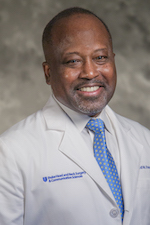
Dr. Francis' research is focused on improving the results of skull base surgery and cochlear implantation in children and adults. Dr. Francis has published over 100 journal articles on these and other topics in collaboration with colleagues from other disciplines. Among other contributions, this work has reduced complications related to acoustic neuroma surgery and has improved the ability to identify older adults who require additional support with their cochlear implant.
Steven J. Eliades, MD, PhD
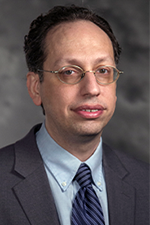
Dr. Eliades’ research focuses on the neural basis of hearing and vocal communication. Communication is a dynamic process that encompasses both production and perception, occurring in an interactive and contextually-dependent fashion. This work encompasses questions of vocal self-monitoring, mechanisms of vocal production and feedback-dependent vocal control, sensory processing in naturalistic listening situations, and social/contextual contributions to hearing and communicative behaviors. The research in his group combines both basic scientific approaches in model organisms and parallel investigations in human subjects, including patients with hearing and communication disorders.
Kristal M. Riska, AuD, PhD, CCC-A
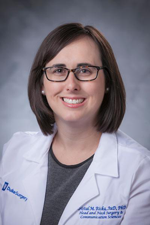
Dr. Riska's research program’s overarching goals are to improve the diagnosis and management of dizziness, falls, and vestibular disorders. Her research focuses in three strategic areas: 1) improving the identification of Benign Paroxysmal Positional Vertigo in primary care settings to enable timely access to cost-effective treatment, 2) characterizing the role of vestibular function and rehabilitative strategies in post-concussive/mild traumatic brain injury related dizziness; and 3) identifying and understanding the mechanisms that mediate the association between falls and hearing loss in an effort to develop interventions that will modify falls risk in the hearing impaired population.
Sherri L. Smith, AuD, PhD, CCC-A
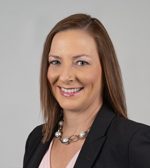
Dr. Smith's core research focuses on improving the assessment and treatment of hearing loss in older adults. Specifically, her work centers on comparing the effectiveness of current hearing interventions, developing new, innovative clinical tools, and examining alternative service-delivery approaches that help patients reach their individual hearing goals and improve their quality of life. Dr. Smith also collaborates with multi-disciplinary teams to better understand the impact of hearing loss on other health conditions and services.
Debara L. Tucci, MD, MS, MBA, FACS
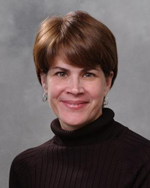
Dr. Tucci's research focuses on the identification and treatment of hearing loss in adults. Her research team works with primary care providers and a national network of otolaryngology providers to identify and address barriers to hearing health care, with the goal of facilitating treatment and improved overall mental and physical health. An adjunct professor in the Department, Dr. Tucci's primary role is as Director of National Institute on Deafness and Other Communication Disorders.
Jianxin Bao, PhD
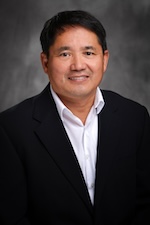
Dr. Bao’s group focuses on understanding both cellular and molecular mechanisms underlying hearing loss and tinnitus, the two most common hearing diseases. Dr. Bao’s group develops new functional and molecular technological platforms to study cochlear synaptopathy in both preclinical and clinical models. They also have established a new method to detect tinnitus in preclinical models, and now focuses on determining detailed connections between tinnitus and synaptic plasticity in the brain.
Hearing and Balance Research Laboratory
Research in the Hearing and Balance Research Laboratory focuses on advancing understanding of hearing and balance disorders through the development of innovative assessment and treatment techniques, and service delivery approaches. Furthermore, it is the lab's goal to carry out multi-disciplinary research to better understand how hearing loss and balance disorders impact the health and well-being of the whole person, in addition to their significant others and the public at large.
Harnessing the Power of AI in Otolaryngology & the Communication Sciences